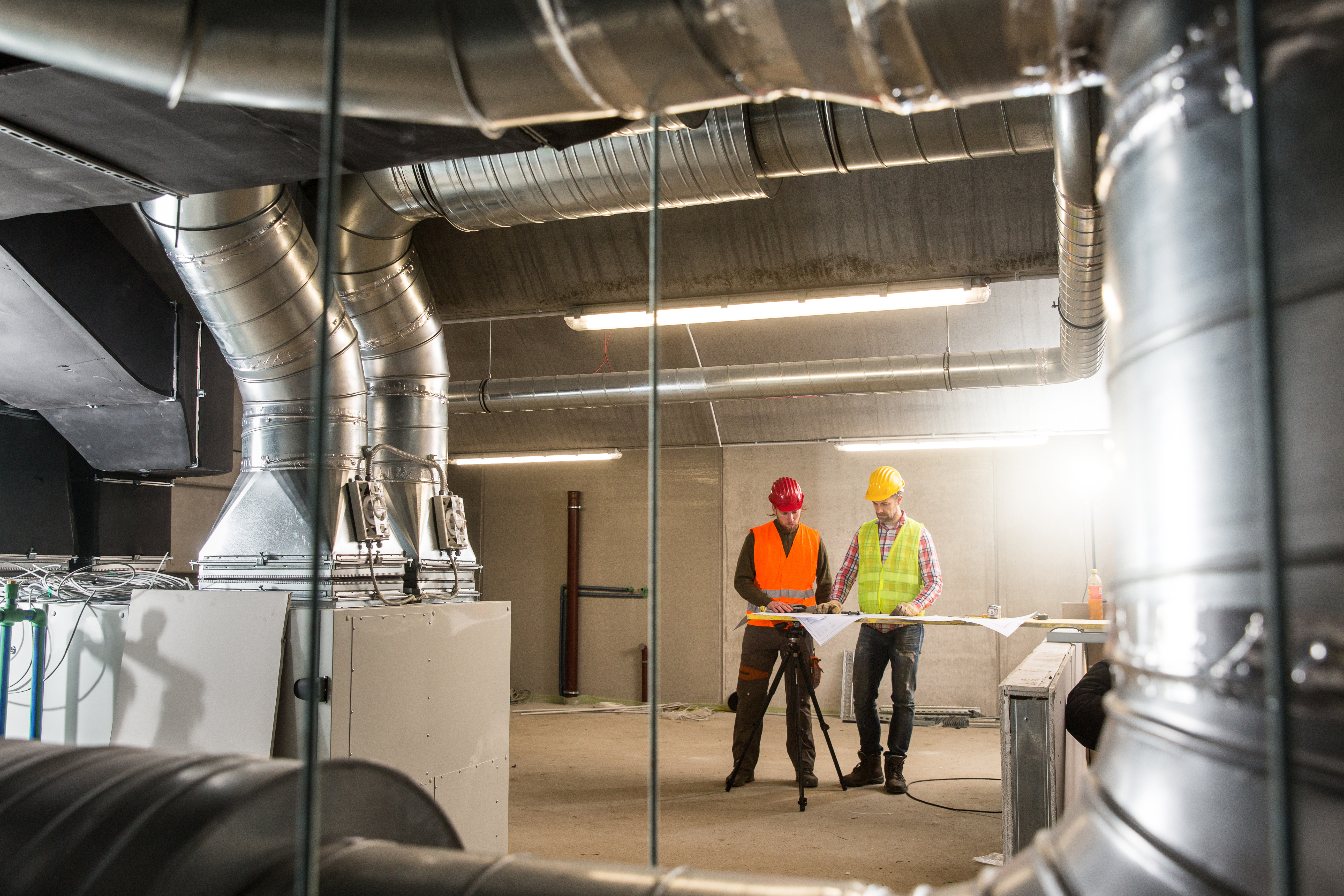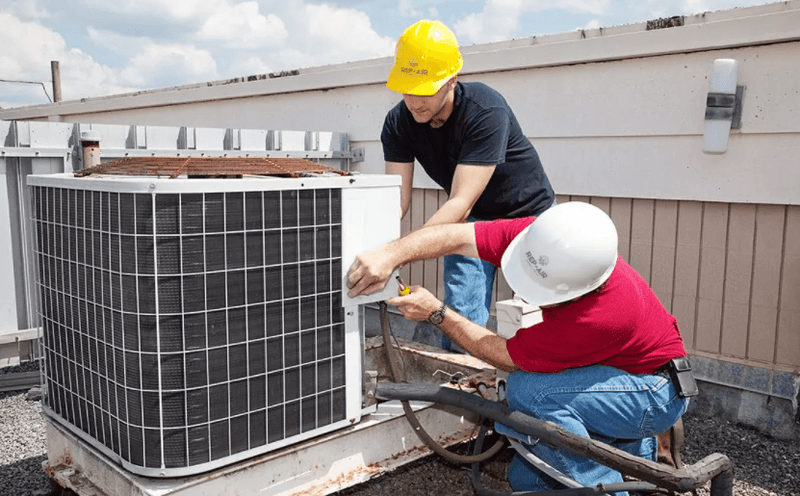Learn how HVAC experts keep your system performing efficiently
Wiki Article
Exploring the Crucial Parts of an Effective Cooling And Heating System
An effective a/c system is built on numerous important elements that function in harmony. Each component, from the thermostat to the ductwork, plays a necessary function in maintaining comfort and power efficiency. Understanding these aspects is critical for maximizing efficiency and boosting indoor air high quality. As one examines these components, the intricate partnerships in between them reveal insights right into enhancing overall system effectiveness. What specific factors contribute most to this performance?The Duty of the Thermostat in Heating And Cooling Efficiency

Frequently neglected, the thermostat plays an important role in the efficiency of Cooling and heating systems. This small gadget serves as the main nerve center, managing temperature setups and guaranteeing excellent convenience within a space. By properly sensing the ambient temperature, the thermostat interacts with the ventilation, heating, and air conditioning systems to preserve the desired climate
A reliable thermostat minimizes energy intake by turning on the a/c system only when needed, therefore avoiding extreme heating or air conditioning. Modern programmable and smart thermostats boost this performance better by permitting customers to set schedules and from another location adjust settings, adjusting to daily routines.
Moreover, the positioning of the thermostat is important; incorrect area can result in inaccurate temperature level analyses, causing ineffective procedure. Generally, a well-functioning thermostat not only improves comfort but additionally adds substantially to energy financial savings and the longevity of the a/c system.
Recognizing the Value of Air Filters
Air filters offer an essential function in heating and cooling systems by guaranteeing that the air distributing within an area continues to be tidy and healthy and balanced. These filters catch dirt, irritants, and other pollutants, preventing them from being recirculated throughout the atmosphere. By capturing these particles, air filters add to boosted indoor air top quality, which can greatly profit passengers' wellness, specifically those with allergies or respiratory system conditions.Furthermore, maintaining clean air filters improves the effectiveness of heating and cooling systems. Clogged up filters can restrict air flow, causing the system to function more challenging to maintain desired temperature levels, resulting in boosted power usage and greater utility expenses. Consistently changing or cleansing filters is a crucial maintenance action that can prolong the life-span of cooling and heating equipment. Ultimately, comprehending the relevance of air filters enables property owners and building supervisors to take proactive actions to guarantee a well-functioning, reliable a/c system that advertises a secure and comfortable interior setting.

The Capability of the Furnace and Warmth Pump
Heaters and heatpump are important elements of cooling and heating systems, responsible for offering heat during cooler months. Heating systems run by home heating air through burning or electric resistance, then distributing it throughout the home by means of air ducts. They commonly provide quick home heating and can be fueled by natural gas, electricity, or oil, depending upon the system type.Conversely, warmth pumps move warmth rather than generate it. They draw out warm from the outside air or ground, even in reduced temperature levels, and transfer it inside. HVAC experts. This twin functionality permits heatpump to also provide cooling in warmer months, making them versatile options for year-round climate control
Both systems need proper maintenance to guarantee performance and longevity. While heating systems stand out in severe cool, warm pumps can be advantageous in moderate climates. Comprehending their distinct performances aids home owners in choosing the most appropriate alternative for their heating needs.
Checking Out the Air Conditioning System
The air conditioning system is a vital element of HVAC systems, readily available in different types to fit different demands. Comprehending the effectiveness ratings of these systems is crucial for making educated selections about energy consumption and cost. This area will explore the varied types of a/c and clear up exactly how effectiveness rankings impact efficiency.Sorts Of Air Conditioners
While numerous factors affect the choice of air conditioning systems, understanding the various types available is crucial for property owners and structure supervisors alike. Central air conditioners are developed to cool whole homes or buildings, using a network of ducts for air movement. Home window units provide an even more local remedy, perfect for single rooms or tiny areas. Mobile a/c supply versatility, permitting customers to relocate the unit as required. Ductless mini-split systems are one more choice, combining the performance of main systems with the convenience of zoning, as they require no ductwork. Geothermal systems harness the planet's temperature level for energy-efficient air conditioning. Each type features unique advantages, making notified options essential for reliable environment control.
Effectiveness Rankings Clarified
Recognizing efficiency rankings is crucial for selecting the best a/c system, as these metrics supply insight right into the system's efficiency and energy usage. The most typical ranking for ac unit is the Seasonal Power Effectiveness Ratio (SEER), which gauges the cooling outcome throughout a normal air conditioning period separated by the total electrical energy input. A higher SEER suggests far better performance. In addition, the Power Performance Ratio (EER) is used for gauging efficiency under particular conditions. Another important metric is the Power Celebrity accreditation, which indicates that an unit meets stringent energy efficiency guidelines. By evaluating these rankings, customers can make educated options that not just maximize convenience but likewise lower power expenses and ecological influence.The Importance of Ductwork and Air flow
Efficient ductwork layout and airflow management play critical duties in the overall performance and efficiency of cooling and heating systems. Proper ductwork assurances that conditioned air is distributed evenly throughout an area, decreasing temperature fluctuations and improving convenience. Properly designed air ducts minimize resistance to air flow, lowering the work on HVAC tools and ultimately reducing energy consumption.Airflow management includes tactically positioning vents and signs up to enhance the flow of air. This prevents usual problems such as hot or chilly spots, which can take place when air flow is blocked or inadequately balanced. In addition, the best duct materials and insulation can better enhance efficiency by lowering warm loss or gain during air transportation.
An efficient ductwork system not only adds to energy savings yet can additionally extend the life-span of a/c devices by reducing unnecessary stress (HVAC experts). Comprehending the relevance of ductwork and airflow is essential for attaining peak A/c system efficiency.
Regular Maintenance Practices to Boost Performance
Normal maintenance methods are necessary here for guaranteeing peak performance of HVAC systems. These techniques consist of regular assessments, cleansing, and needed repair services to maintain the system running effectively. Routinely transforming air filters is vital, as stopped up filters can block air movement and minimize performance. On top of that, service technicians must check and clean evaporator and condenser coils to avoid getting too hot and energy waste.Yearly specialist evaluations are additionally advised, as trained service technicians can identify prospective problems before they intensify. Lubing relocating components minimizes damage, contributing to a much longer life expectancy for the system. Guaranteeing that the thermostat operates properly aids in keeping suitable temperature level control.
Often Asked Questions
Just how Usually Should I Replace My Thermostat?
Thermostats should normally be changed every 5 to 10 years, depending on usage and technology innovations. Routine checks are a good idea to ensure peak performance, specifically if experiencing inconsistent temperature level control or enhanced power expenses.What Size Air Filter Is Finest for My Heating And Cooling System?
The very best size air filter for a heating and cooling system differs by unit style. Typically, it's crucial to consult the proprietor's handbook or examine the existing filter dimensions to ensure peak efficiency and air quality.Can I Install a Warm Pump Myself?
Mounting a warmth pump separately is feasible for knowledgeable individuals, yet it requires knowledge of electric systems and regional codes. Employing a specialist is recommended to ensure appropriate installment and suitable system performance.Exactly how Do I Know if My Ductwork Is Efficient?
To establish ductwork efficiency, one must examine for leakages, action air movement at vents, evaluate insulation quality, and assess temperature distinctions in between supply and return air ducts. Specialist analyses can provide extensive understandings right into total efficiency.What Are Indications My HVAC Needs Immediate Maintenance?
Signs that a HVAC system requires instant maintenance consist of unusual sounds, irregular temperature levels, raised energy bills, unpleasant smells, and constant cycling. Attending to these concerns immediately can avoid further damage and guarantee top system efficiency.Air filters offer an essential function in HVAC systems by guaranteeing that the air circulating within an area stays clean and healthy and balanced. In addition, preserving clean air filters boosts the efficiency of Cooling and heating systems. Ductless mini-split systems are an additional choice, incorporating the efficiency of main systems with the comfort of zoning, as they need no ductwork. Understanding efficiency ratings is essential for choosing the ideal air conditioning device, as these metrics give understanding right into the system's performance and power consumption. The ideal size air filter for a Cooling and heating system differs by device layout.
Report this wiki page